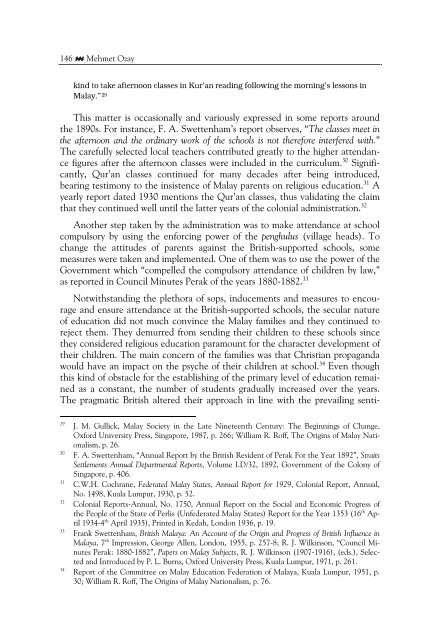İçindekiler - İlahiyat Fakültesi - Marmara Üniversitesi
İçindekiler - İlahiyat Fakültesi - Marmara Üniversitesi
İçindekiler - İlahiyat Fakültesi - Marmara Üniversitesi
Create successful ePaper yourself
Turn your PDF publications into a flip-book with our unique Google optimized e-Paper software.
146 Mehmet Ozay<br />
kind to take afternoon classes in Kur’an reading following the morning’s lessons in<br />
Malay.” 29<br />
This matter is occasionally and variously expressed in some reports around<br />
the 1890s. For instance, F. A. Swettenham’s report observes, “The classes meet in<br />
the afternoon and the ordinary work of the schools is not therefore interfered with.”<br />
The carefully selected local teachers contributed greatly to the higher attendance<br />
figures after the afternoon classes were included in the curriculum. 30 Significantly,<br />
Qur’an classes continued for many decades after being introduced,<br />
bearing testimony to the insistence of Malay parents on religious education. 31 A<br />
yearly report dated 1930 mentions the Qur’an classes, thus validating the claim<br />
that they continued well until the latter years of the colonial administration. 32<br />
Another step taken by the administration was to make attendance at school<br />
compulsory by using the enforcing power of the penghulus (village heads). To<br />
change the attitudes of parents against the British-supported schools, some<br />
measures were taken and implemented. One of them was to use the power of the<br />
Government which “compelled the compulsory attendance of children by law,”<br />
as reported in Council Minutes Perak of the years 1880-1882. 33<br />
Notwithstanding the plethora of sops, inducements and measures to encourage<br />
and ensure attendance at the British-supported schools, the secular nature<br />
of education did not much convince the Malay families and they continued to<br />
reject them. They demurred from sending their children to these schools since<br />
they considered religious education paramount for the character development of<br />
their children. The main concern of the families was that Christian propaganda<br />
would have an impact on the psyche of their children at school. 34 Even though<br />
this kind of obstacle for the establishing of the primary level of education remained<br />
as a constant, the number of students gradually increased over the years.<br />
The pragmatic British altered their approach in line with the prevailing senti-<br />
29<br />
J. M. Gullick, Malay Society in the Late Nineteenth Century: The Beginnings of Change,<br />
Oxford University Press, Singapore, 1987, p. 266; William R. Roff, The Origins of Malay Nationalism,<br />
p. 26.<br />
30<br />
F. A. Swettenham, “Annual Report by the British Resident of Perak For the Year 1892”, Straits<br />
Settlements Annual Departmental Reports, Volume I.D/32, 1892, Government of the Colony of<br />
Singapore, p. 406.<br />
31<br />
C.W.H. Cochrane, Federated Malay States, Annual Report for 1929, Colonial Report, Annual,<br />
No. 1498, Kuala Lumpur, 1930, p. 52.<br />
32<br />
Colonial Reports-Annual, No. 1750, Annual Report on the Social and Economic Progress of<br />
the People of the State of Perlis (Unfederated Malay States) Report for the Year 1353 (16 th April<br />
1934-4 th April 1935), Printed in Kedah, London 1936, p. 19.<br />
33<br />
Frank Swettenham, British Malaya: An Account of the Origin and Progress of British Influence in<br />
Malaya, 7 th Impression, George Allen, London, 1955, p. 257-8; R. J. Wilkinson, “Council Minutes<br />
Perak: 1880-1882”, Papers on Malay Subjects, R. J. Wilkinson (1907-1916), (eds.), Selected<br />
and Introduced by P. L. Burns, Oxford University Press, Kuala Lumpur, 1971, p. 261.<br />
34<br />
Report of the Committee on Malay Education Federation of Malaya, Kuala Lumpur, 1951, p.<br />
30; William R. Roff, The Origins of Malay Nationalism, p. 76.



